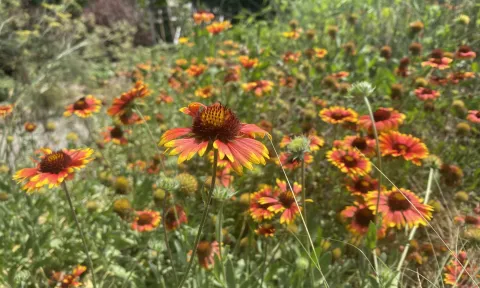Plant of the Month

Gaillardia, also known as blanketflower, comes in a variety of species and performs well through the summer and fall in rock gardens, pollinator plots or native plant collections.
The blanketflower is a dazzling little plant that is easy to grow, easy to combine and easy to love. With its long flowering time, gorgeous coloring and tolerance to summer heat, it’s a powerhouse sure to be a treasure all year long.
There are about 25-30 species of Gaillardia with most being native to North America. The common garden variety, Gaillardia x grandiflora, is a hybrid between Gaillardia pulchella, the southeastern blanketflower, and Gaillardia aristata, the prairie blanketflower. Gaillardia x grandifolia offers the best of both worlds: large flowers, a perennial habit and a long bloom time.
Gaillardia x grandifolia is a relatively short-lived perennial with a mounding or sprawling habit. It reaches a height of 1-3 feet and can sprawl in clumps about 2 feet wide. It flowers best in full sun. It prefers well-drained soils, and once established, it rarely needs water outside of extreme drought events. It can grow in heavier soils, but chances of winter survival are greatly diminished–planting in berms or containers can be utilized in clay-heavy areas. They have few pest problems, and deer and rabbits tend to avoid them.
The plant flowers in the late spring and does not stop until frost. Although the parent plants tend to fizzle out in 2-3 years, they are readily propagated from seed or division and self-sow easily. Seed-grown plants will generally bloom in their second year; plants purchased from the nursery are often ready to flower. Deadheading is not required, but it will encourage more and bigger blossoms and keep the plants tidier. Cutting back in midsummer can encourage root growth and an attractive shape for the latter half of the season. Take care when handling the plant. Its leaves contain a compound called lactone, which can be irritating to some, so gloves should be worn by gardeners with sensitive skin.
Gaillardia is perfect in rock gardens, pollinator meadows or native plant collections. The medium textured grey-green foliage contrasts well with the coarser textures of Opuntia cactus, yucca or sedum, as well as the more delicate textures of ornamental grasses (Mexican feather grass is a favorite), liatris, rosemary or yarrow. It harmonizes well with similar-textured Coreopsis, coneflower, Rudbeckia, or Agastache.
Popular cultivars of Gaillardia include the All-America-Selection winners ‘Arizona Apricot,’ ‘Mesa Yellow,’ ‘Arizona Sun’ and ‘Red Plume.’ You can find it growing at UT Gardens in Knoxville, in our rock and cactus gardens.
The UT Gardens includes plant collections located in Knoxville, Crossville, and Jackson, Tennessee. Designated as the official botanical garden for the State of Tennessee, the UT Gardens are part of the UT Institute of Agriculture. The Gardens’ mission is to foster appreciation, education and stewardship of plants through garden displays, educational programs and research trials. The gardens are open during all seasons and free to the public.
Submitted by Karen Caspary, volunteer coordinator and horticulturist, UT Gardens, Knoxville
- Log in to post comments